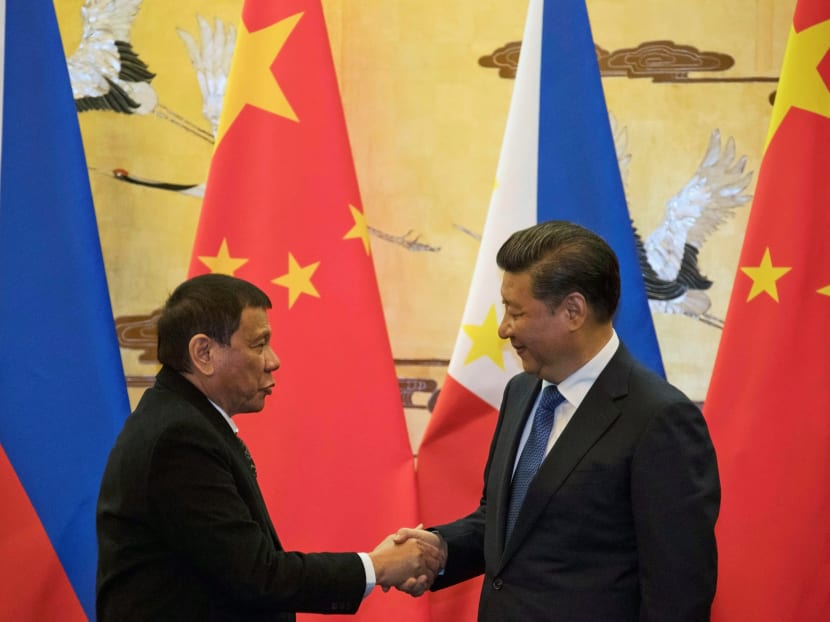'I need China': Duterte's pivot to Beijing shows signs of payoff
MANILA — Philippine President Rodrigo Duterte was full of praise for Beijing and even declared his love for Chinese President Xi Jinping as he embarked on his third visit to China this week to foster warmer ties strained by a territorial dispute in the South China Sea.

Philippines President Rodrigo Duterte (L) and Chinese President Xi Jinping shake hands after a signing ceremony held in Beijing, China.
MANILA — Philippine President Rodrigo Duterte was full of praise for Beijing and even declared his love for Chinese President Xi Jinping as he embarked on his third visit to China this week to foster warmer ties strained by a territorial dispute in the South China Sea.
"More than anybody else at this time of our national life, I need China," Mr Duterte said at a briefing on March 9, adding that China's help is a "very important ingredient" in his US$180 billion (S$235.47 billion) infrastructure push.
Almost two years into his presidency, Mr Duterte's pivot to China is showing some signs of economic payoff, particularly in tourism and investment. Even so, the country continues to rely heavily on its traditional trading partners like Japan, United States, South Korea and the Netherlands.
TOURISM
China became the nation's fastest-growing tourism market since Mr Duterte took office in June 2016. The number of Chinese tourists to the Philippines doubled to almost 1 million in 2017 from 2015. South Korea remains the Philippines' top tourist source.
INVESTMENT
Chinese foreign direct investments to the Philippines increased almost 20-fold in 2016 when Mr Duterte became president, although these are still dwarfed by investments from other countries.
LOANS, GRANTS
Since the territorial dispute with China restarted in 2011, aid from China dwindled, and almost dried up in the last two years of Duterte's predecessor Benigno Aquino's government. Now, China has pledged US$7.34 billion in loans and grants for various infrastructure projects including two bridges in the capital, according to the Finance Department.
TRADE
China has been the Philippines' top trading partner for the past two years, but the trade balance in China's favour continues to balloon as increasing imports outpace exports growth. China lags behind US and Japan as an export market for the Philippines, although it is the nation's top source of imports. Philippine and Chinese officials aim to balance bilateral trade during Mr Duterte's six-year term as president.
NO LONG-TERM DEALS
The benefits from warming ties with China "are nowhere near as great" as the countries' officials portray them to be, Gregory Poling, a fellow at the Washington-based Center for Strategic and International Studies said in an email. He noted that loans and grants pledged by China haven't translated to projects, and said Beijing still trails far behind other trade and investment partners. Philippine Economic Secretary, Ernesto Pernia, said in February that loan terms from Japan are better than China.
Then there's the estimated 4 trillion cubic feet of natural gas reserves worth billions of dollars that the US Energy Information Administration says could be in South China Sea areas claimed by the Philippines, indicating the benefits of warming ties may be outstripped by potential losses.
"When it comes to the most obvious place where relations have shifted — the West Philippine Sea — the two sides are no closer to any long-term deals to manage the disputes than they were two years ago," Mr Poling said. BLOOMBERG






